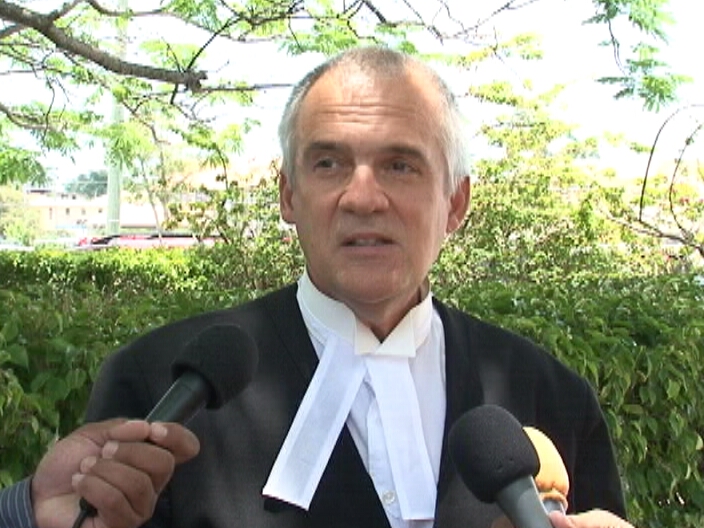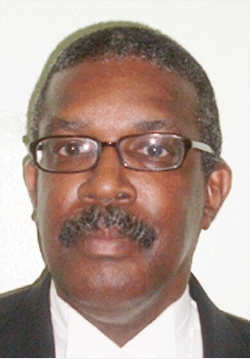Final arguments in Belize sodomy case
Colin Stewart is a 45-year journalism veteran living in Southern…
It’s Day 4 of the constitutional challenge against the Belize sodomy law, Section 53, brought by Caleb Orozco, leader of the United Belize Advocacy Movement (Unibam). Asa DeMatteo, a clinical psychologist living with his same-sex spouse in San Francisco, is blogging from the courtroom in Belize. Links to coverage of the first three days are below.
Here’s the play-by-play from DeMatteo:

Church advocate [Eamon Courtenay] opens morning session.
Church argues for a strict interpretation of the Belize constitution, which has no explicit mention of sexual orientation.
Court vs. legislature
Public morality, health, policy, and social issues do not belong before this court.
Cites Singapore case and asks court to follow. Judgment should be tilted in favor of legislature.
The relief that claimant ask for should be directed toward Belmopan (legislature) not Belize City (court).
As far as sexual intimacy is involved, it not the question to be asked of the court: How many more must die?
Claimant is asking court to pull out its whip and lash the backs of the legislature for not having acted on this law.
That is not the role of the court in a constitutional democracy.
Effects of the law

A “chilling effect” has been claimed. “I don’t believe that one bit.”
The current argument seems to be that no one is arrested under S53 for consensual same sex intimacy.
Had Orozco suffered a real risk of prosecution under S53, this would be and entirely different case.
Orozco advocate objects: Church advocate has asked us not to look at an affidavit that he now refers to. Inappropriate.
Objection sustained. Justice holds up his copy of affidavit to show that he had already drawn a line through it.
The stigma and social disapproval that claimant complains of cannot be changed by alteration of S53.
Discussion of the legislature’s role again
There exists a report recommending repeal of S53 now in the legislature.
I am informed that the report is the Universal Periodical Review of the UN Human Rights Council.
The reports of Mr. Orozco consistently ask for modification of public policy and legislation.
The evidence, I stress that, the evidence in this case all points to Belmopan. They say they are tired of waiting.
That delay is not a court matter.
Today’s scene in the courtroom
Aside: The courtroom is completely filled today.
Meanwhile, back to the legal arguments …
The court has jurisdiction on constitutional matters when constitutional matters are ambiguous.
If the court finds S53 inconsistent with the constitution, then what?
What section of the constitution would provide guidance to the court on how to choose between options offered by claimant?
If the court finds S53 unconstitutional, and the parliament doesn’t like it, its only option is to amend the constitution.
We don’t have an injury in the evidence. What we have is a public policy litigation.
What S53 should look like if court finds it unconstitutional must be a matter for the parliament.
And the churches conclude their case. Ten minute recess. The court is abuzz with chatter.
It’s the turn of claimant Caleb Orozco’s advocate again

Court resumes with Christopher Hamel-Smith for the claimant.
Remarkable that a case so carefully prepared, researched, and presented for the plaintiffs to rely on technicalities.
Remarkable that they urge the judiciary and this court to depend on procedural technicalities and not the facts of the case.
This is cynical.
Their argument is inconsistent with both principle and authority. Cites authorities.
The court has the right to: make deletions, strike out, substitute, alter, or otherwise tell us what a law says.
It has the duty to determine the constitutionality of a law. That right does not belong to the legislative branch.
The other side is saying, in effect, please don’t give us the answer because we might not like that answer.
To imagine that the legislature can violate basic fundamental rights by the majority support is, in a word, absurd.
It’s a complete reversal of the authorities to say because claimant has not be charged with violating S53 he lacks a claim.
The claimant has told us that he is a homosexual and that he engages in sexual intimacy in his home. That’s enough.
Overwhelming force of the evidence in this case, unchallenged, documents the risk to all homosexuals by this legislation.
We should remember that S53 is a relic from the colonial era. But it is necessary to do spring cleaning from time to time.
Both the courts and the legislature have to participate in this task.
Morality and minorities
The churches fight tooth and nail, saying that the sky will fall and public morality will disintegrate unless . . .
. . . what Mr. Orozco is already doing is maintained as illegal.
(Battery going. I’ll tweet my notes.)
Law always involves public policy. Law tells society where the lines are. That’s why we must have fundamental rights.
Fundamental rights constrain society from intruding on those rights.
What is a small minority to do when its fundamental rights are violated other than look to the courts?
And now a moment for theology
Hamel-Smith: “I come from a Christian tradition and think of ‘what you do for the least of my children . . .”
[From Matthew 25: 31-46, in which the Son of Man says, “Truly I tell you, whatever you did for one of the least of these brothers and sisters of mine, you did for me.” (New International Version)]Hamel-Smith: “If this minority is not the least of my children, who is?”

Chief Justice Kenneth Benjamin: “Can we have less theology and more case?”
Hamel-Smith apologizes.
Right to privacy
The defendant asks “Where is the right in the constitution to homosexual sex.”
They claim no privacy right engaged by homosexual sex, but offer no support or evidence for this.
Fortunately for the court, Belize constitution contains a clear fundamental right to privacy.
The only way a fundamental right can be breached is if it is REQUIRED for public morality, and must be evaluated as such.
We are not talking of public behavior, but private.
Specificity is required of any law, and particularly where there is criminality attached to it. It’s a high standard.
Homosexuality: ‘normal variant’ or ‘unnatural’?
The evidence, expert evidence, all points to homosexuality as a normal variant or human sexuality.
The church counters with the assertion, not evidenced, that homosexuality is unnatural.
They are free to, the right to continue to hold that belief. They do not have the right to inject it into criminal law.
They are honest, sincere caring people who do good and have no animus in holding to a Biblical principle.
But the alpha and omega of the law is the constitution, not the Bible.
S53 does nothing to affect public morality. It does nothing at all.
Belize obligations under treaty it signed
S53 is a violation of the International Covenant on Civil and Political Rights ICCPR (1966).
Whether this document [ICCPR] is right or wrong, Belize, as a sovereign nation read it and agreed to it.
This agreement said to the world “This is what we will insure that the people of Belize enjoy.”
They now say they don’t wish to be bound by foreign treaties or international law. Speak out of both sides of their mouths.
S53 is completely inconsistent with the ICCPR.
Adjourn for lunch. Chief Justice will present any questions he has at a brief afternoon session.
After lunch
Back in court waiting to reconvene.
And the end begins.
Justice: I just want to inform that I have no questions.
Justice: Are there any housekeeping matters to attend to? (no response) Court adjourns.
Belize court coverage, day by day:
DAY 1
Dramatic scene: Challenge to Belize sodomy law under way
Belize challenge to anti-gay law, 140 characters at a time
DAY 2
Belize sodomy law on trial, Day 2
DAY 3
Day 3: Defenders of Belize sodomy law
DAY 4
Final arguments in Belize sodomy case (this article)


